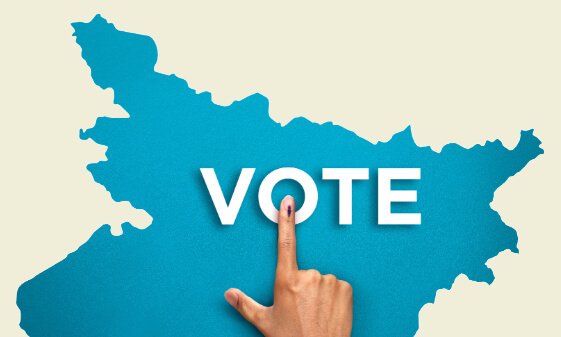By Sticking to Legalities, Election Commission Risks Voter Exclusion in Bihar
Uses Premise that Neither Aadhaar nor Ration Cards Confirm Citizenship Status
July 23, 2025
The Election Commission of India (ECI), in its affidavit to the Supreme Court, has adopted a legally defensible posture in excluding Aadhaar and ration cards from the list of documents used to determine voter eligibility during the Special Intensive Revision (SIR) of electoral rolls in Bihar. While the legal scaffolding may hold, the process reflects a troubling departure from ethical electoral practice, especially from the perspective of ordinary citizens trying to assert their right to vote.
The ECI has invoked Article 326 of the Constitution and various High Court judgments to ground its position in law, as reported by Bar and Bench. It clearly links the right to vote to citizenship, and the ECI’s argument rests on the premise that neither Aadhaar nor ration cards confirm citizenship status. The distinction it draws between identity and eligibility may be seen as technically accurate. Aadhaar verifies identity, but citizenship is a separate legal status requiring other forms of proof, the Commission has argued.
In citing rulings such as “Rani Mistri v. State of West Bengal,” the Commission has pre-emptively addressed potential legal challenges by pointing to judicial precedent. However, this focus on legal defensibility shows a problem. The ECI is treating electoral eligibility as a narrowly technical exercise, ignoring the lived realities of large swathes of the population for whom Aadhaar or ration cards are often the only available documents.
From a citizen’s standpoint in Bihar, the exclusion of Aadhaar and ration cards undermines the democratic ideal of universal suffrage. Bihar is one of India’s poorest states, with over 33 percent of its population living below the poverty line as per NITI Aayog’s 2021 Multidimensional Poverty Index.
In rural areas, where nearly 89 percent of the state’s population resides, access to official documentation is often limited by bureaucratic hurdles, low literacy and poor administrative outreach. For many in these communities, Aadhaar and ration cards are the only forms of state-issued identification they possess.
Aadhaar enrolment in Bihar stands at over 95 percent of the population, and ration cards are the primary gateway to subsidised food for more than 80 million people under the Public Distribution System. By disregarding these documents for voter eligibility, the Election Commission is effectively blocking the most practical means through which the poor, the marginalised and the rural can assert their constitutional right to vote.
Aadhaar has been widely promoted by the state itself as a near-universal proof of identity and residence for accessing everything from food to pensions to bank accounts. The same state apparatus is now turning around and saying that Aadhaar is insufficient to even be considered for electoral eligibility screening. This will lead to confusion and disenfranchisement. It creates a dual standard: one for accessing entitlements, another for asserting democratic rights.
Furthermore, while the ECI notes that Aadhaar numbers are still being collected “for the limited purpose” of identity verification, it fails to acknowledge the power imbalance this creates during on-the-ground implementation. When field officers ask people for their Aadhaar numbers while filling out the Enumeration Form, the request carries the weight of official authority, even if technically optional. Most citizens, especially in rural Bihar where literacy levels are low and bureaucratic processes are opaque, are unlikely to grasp the legal nuance between what is voluntary and what is required. In such settings, people tend to comply automatically with any demand made by an official, fearing that non-compliance might lead to exclusion from the voter list or future complications.
What makes this more concerning is that sharing one’s Aadhaar number, even when optional, may carry hidden disadvantages. The Aadhaar database is not a proof of citizenship, and any discrepancies in demographic details, such as name, age or address, that differ from the electoral roll could raise doubts about a person’s eligibility. This could lead to unnecessary scrutiny, delays in verification or even wrongful exclusion from the rolls.
The ration card exclusion raises similar concerns. While the Commission points out that many such cards are fake or temporary, it offers no transparent methodology for how it assesses the validity of other documents in its accepted list. If the ration card system is so flawed that its documents are untrustworthy, it raises questions not only about voter ID processes but also about how food security itself is administered.
The Commission does add, almost as an afterthought, that the list of 11 accepted documents is not exhaustive. But this does little to mitigate the impact of its exclusions. In practice, the list functions as the primary framework for inclusion. The burden of proof is shifted to the voter, who must now navigate an opaque and often hostile administrative maze to assert a right that is, in theory, guaranteed.
A deeper ethical issue emerges from this positioning. The revision of the electoral roll is a critical exercise in sustaining representative democracy. When the process allows too much discretion or causes confusion, it invites bias, discrimination or manipulation. In Bihar, where political mobilisation is deeply influenced by caste structures and migration flows, any lack of clarity in implementation can be used to influence outcomes. The legal framework may be intact, but without attention to fairness and accessibility, the process risks excluding those it is meant to include.
You have just read a News Briefing by Newsreel Asia, written to cut through the noise and present a single story for the day that matters to you. Certain briefings, based on media reports, seek to keep readers informed about events across India, others offer a perspective rooted in humanitarian concerns and some provide our own exclusive reporting. We encourage you to read the News Briefing each day. Our objective is to help you become not just an informed citizen, but an engaged and responsible one.

